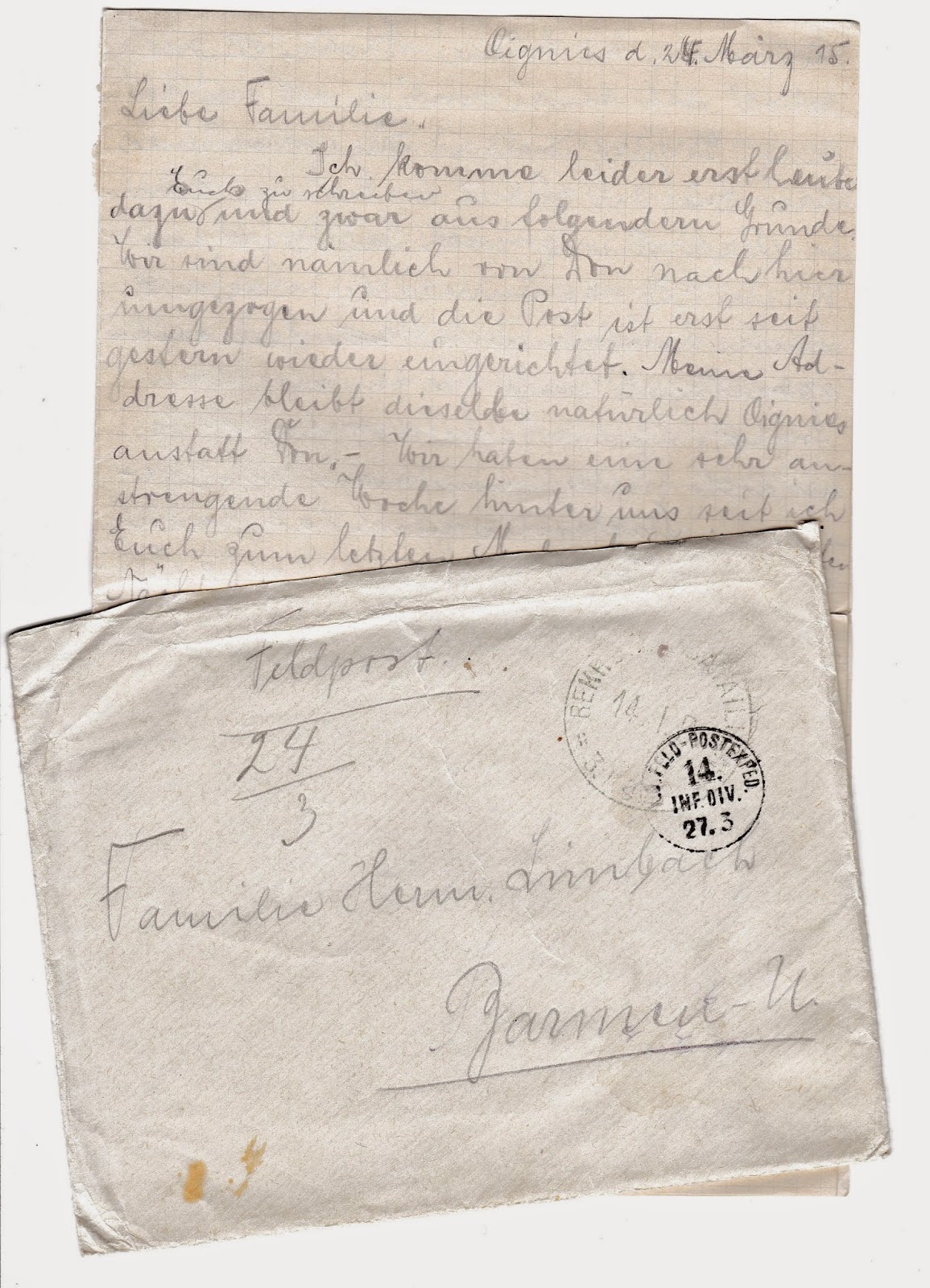Oignies,
31 March 1915
[Wednesday]
Dear family,
Since I last wrote you I haven’t
received any letters from you. I did receive parcels up to #57. Many thanks for
that.
Furthermore I received a parcel from
the Bonerts, and the Wochenschau from
A. Weyerbuschs. Please thank these people for me. I really don’t have time to
write.
Please don’t send me Nestor No 6 cigarettes anymore, they
really are not worth the money.
However I’d like to have a little
stove now. A Heede has a tiny one made out of aluminium, which you can almost
carry in your backpocket, and it takes solid fuel. I believe that is
Hartspiritus [Solid fuel] .[*1]
I don’t need a messtin ofcourse.
Untill we leave such a little thing
will come in very handy. I didn’t know you could get them thát small. A. Heede is
always sent preserves, which he then only has to heat. They taste really good.
When we are then in the trenches
coffee, tea and stockcubes are ofcourse very welcome.
We’ll be leaving end of the week, so
before Easter, and we’ll be going to the
Hacketäuern (Inf. Regt 16) not to the 56’ers. But it doesn’t really matter
to which Regiment you go. [*2]
So our stop here was really short.
Which is a shame really. On the
whole it was very agreeable here. Our officers and sergeants all stay here.
They have to train more recrutes. Which is partly fine, partly not so.
Yesterdaymorning we had pre-inspection
by the Major. Tomorrow follows the proper inspection.
It all went very smothly, and as a
result we had light duties yesterday afternoon and today.
If it all goes just as smoothly
tomorrow they promised us Freibier
[Free beer].
Luckily I am out of the Elitegruppe.
I’ve sprained my right foot a little on the assault course. It’s much better
now. I still limp a little so that I won’t
have to join the Elitegruppe again.
Doch Schluß. It's getting too dark to
write and I’m running out of things to write about.
Probably I’ll write again from here
on Friday.
With many greetings also to all
acquaintances your Fritz
Please send the army stove only when
you have my new address!
[*1] Could not find a picture of a German army stove from WW1, so do not quite know what they looked like, but here's a "Tommy cooker", a UK army cooker from WW1:
[*2]
“Hacketäuern” was the nickname
for Infanterie-Regiment nr 16 :
“On 23 August 1813, during the
Napoleonic Wars, the Infantry Regiment Freiherr von Sparr formed part of the
Prussian army led by von Bülow, supported by Swedish troops commanded by the
ex-French Marshal Jean Bernadotte, which faced a French army headed by Marshal
Oudinot at Gross Beeren. The battle was fought in torrential rain, which
rendered muskets useless, and the soldiers were urged on in hand-to-hand
fighting with their gun butts by cries of 'Hacke
tau!', which literally means something like 'Strike out', but might be
better rendered (in British English, at least) as 'Get stuck in!' or 'Bash on!'
The Prussian/Swedish army won the day and Oudinot retired in disarray. 'Hacke tau!' was then adopted as the
official battle cry of the Regiment”
Nestor cigarettes : (This is nr 4, unable to find a picture of Nestor nr 6 ... )
Nestor cigarettes : (This is nr 4, unable to find a picture of Nestor nr 6 ... )













